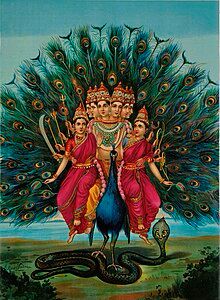Prabhu Kartikeya and Mata Devasena:
By Lokanath Mishra
In the celestial realm of Hindu mythology, a majestic tale of love and devotion unfolds, as the radiant Lord Kartikeya, revered as Murugan, unites with the enchanting Devasena, daughter of Indra, the king of the gods.
Born of the divine union of Shiva and Parvati, Kartikeya was destined to vanquish the Asuras, the malevolent demons that threatened the harmony of the universe. As the commander-in-chief of the gods’ army, Kartikeya’s prowess in battle was unmatched, and his heart belonged to Devasena, the goddess of aspirations.

Their union was a sacred celebration, commemorated during the six-day festival of Skanda Shasti. As the festivities unfolded, devotees were reminded of the transformative power of love and the enduring legacy of this divine marriage.
According to the ancient scriptures, Devasena was born as the daughter of Prajapati Daksha, while some traditions describe her as the daughter of Indra, adopted by Vishnu. Her name, meaning “army of the gods,” reflected her significance in the celestial realm.
The tale of Devasena’s marriage to Kartikeya was a testament to the power of love and devotion. When the gods were defeated by the demons, Indra sought a powerful warrior to lead their army. Devasena, held captive by the demon Keshi, was rescued by Indra and requested his help in finding a husband who could protect her.
Indra and Brahma agreed that a son born of Shiva and Parvati would be suitable, and thus Kartikeya was born. After proving his prowess, Kartikeya was made the commander-in-chief of the gods’ army and married Devasena.
In the realm of Tamil traditions, Devasena was often depicted alongside Kartikeya and his other consort, Valli. While Devasena represented traditional Hindu values, Valli embodied a more free-spirited and independent nature. The two goddesses were sometimes depicted as having a complex relationship, with Devasena representing the established order and Valli symbolizing the power of love and devotion.

Devasena’s worship was revered in certain regions, particularly in Tamil Nadu, where her story served as a reminder of the importance of aspirations, courage, and devotion. Inspiring devotees to strive for greatness, Devasena’s legacy continued to cultivate a deeper connection with the divine, a testament to the enduring power of love and devotion.
